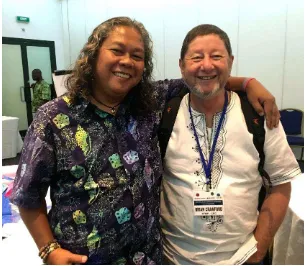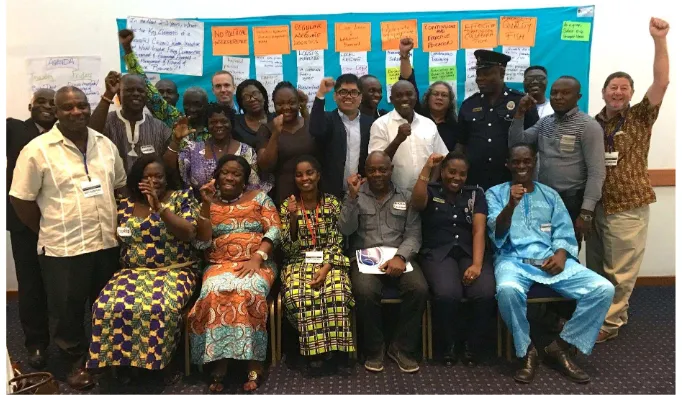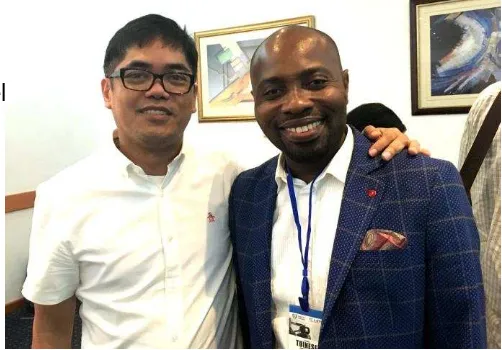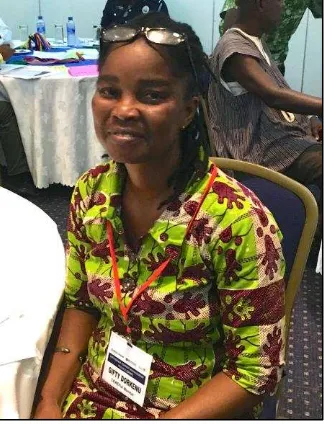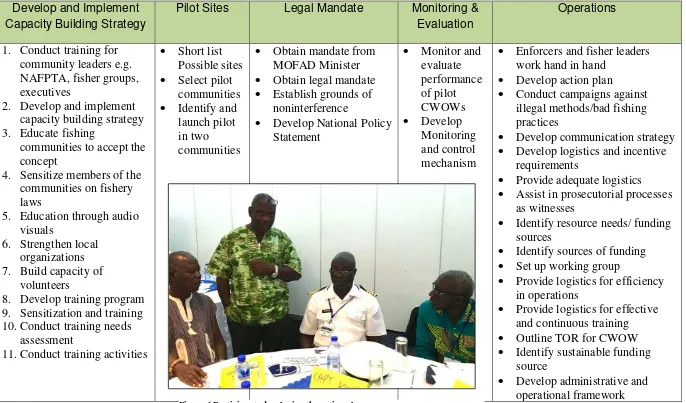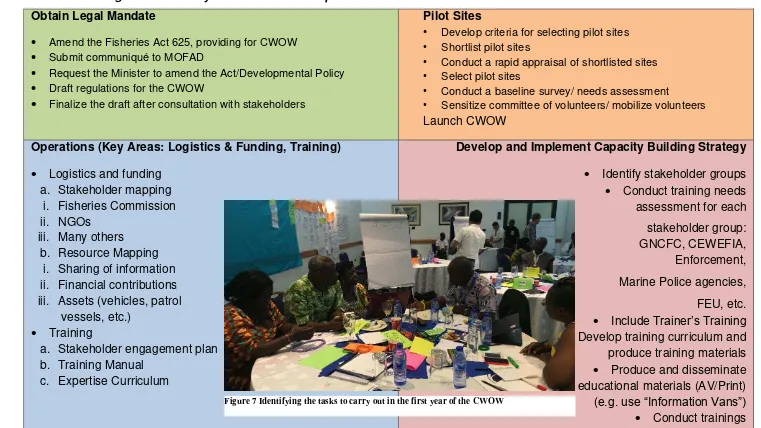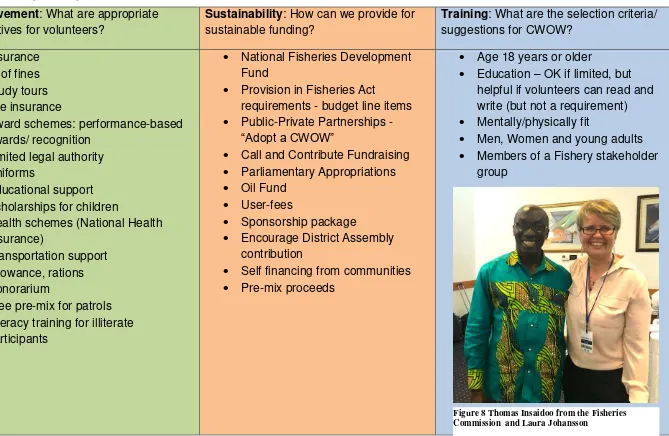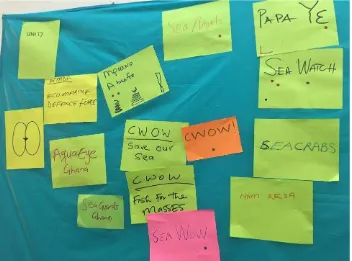Ghana Sustainable Fisheries Management Project (SFMP)
Multi-Stakeholder Workshop to Design a Citizen Watch
on Water Initiative for Fisheries Co-management in
Ghana
This publication is available electronically on the Coastal Resources Center’s website at http://www.crc.uri.edu/projects_page/ghanasfmp/
For more information on the Ghana Sustainable Fisheries Management Project, contact: USAID/Ghana Sustainable Fisheries Management Project
Coastal Resources Center
Graduate School of Oceanography University of Rhode Island
220 South Ferry Rd.
Narragansett, RI 02882 USA
Tel: 401-874-6224 Fax: 401-874-6920 Email: [email protected]
Citation: SSG Advisors. (2016). Multi-Stakeholder Workshop to Design a Citizen Watch on Water Initiative for Fisheries Co-management in Ghana. The USAID/Ghana Sustainable Fisheries Management Project (SFMP). Narragansett, RI: Coastal
Resources Center, Graduate School of Oceanography, University of Rhode Island and SSG Advisors. GH2014_POL017_SSG. 21 pp.
Authority/Disclaimer:
Prepared for USAID/Ghana under Cooperative Agreement (AID-641-A-15-00001), awarded on October 22, 2014 to the University of Rhode Island, and entitled the USAID/Ghana Sustainable Fisheries Management Project (SFMP).
This document is made possible by the support of the American People through the United States Agency for International Development (USAID). The views expressed and opinions contained in this report are those of the SFMP team and are not intended as statements of policy of either USAID or the cooperating organizations. As such, the contents of this report are the sole
responsibility of the SFMP team and do not necessarily reflect the views of USAID or the United States Government.
Forum Description and Objectives
This workshop will allow key stakeholders in the Ghanaian fisheries sector to co-design a framework for a Ghanaian Citizen Watch on Water (CWOW) Program to improve co-management of fisheries in Ghana. During a recent study tour to the Philippines, key stakeholders from the Ghanaian fisheries sector learned about the Philippine Bantay Dagat (Sea Watch) program, in which fisherfolk as well as members of local coastal communities volunteer to aid in the detection of illegal fishing as well as the enforcement of coastal and marine laws. Study tour participants recognized the potential benefits of developing a similar community-based monitoring and enforcement program to support effective co-management of fisheries in Ghana. This workshop will draw upon the successes and challenges in the development and implementation of the Bantay Dagat program in the Philippines as well as existing policies, plans, programs, and relevant institutional frameworks in Ghana.
The key objective of this workshop will be to create a framework to guide the initial development and implementation of a community-based fisheries monitoring and enforcement program. Following this initial design exercise, SSG will draft a design document and legal framework, to outline the Citizen Watch on Water program at the national level. This design document will be circulated to all participants for comment. Following approval of the program design, SSG will organize a second design workshop in Ghana, this time to design and plan the initial program pilot.
Workshop Activities and Discussion
March 17th, 2016 – Day 1
Overview of Filipino Bantay Dagat Initiative and Study Group Reflections.
Filipino conservation expert Romy Trono presented a brief introduction to the Philippine Bantay Dagat program. He discussed the creation of the program, the program goals and objectives, key components and structure, the incentives and motivations of the Bantay Dagat volunteers, and successes and challenges.
Current Reality.
Each stakeholder group discussed their current reality with regards to illegal fishing and conservation efforts in Ghana and verbally shared one highlight of their discussion.
Legal Review Presentations and Recommendations.
First, Atty. Mario Maderazo from the Philippines presented an overview of the key policy, legal,
institutional, and regulatory foundations for the Bantay Dagat program in the Philippines.
Second, Atty. Tuinese Edward Amuzu presented on his review of current Ghanaian laws and policies vis-à-vis the Citizen Watch program, including identified gaps and key recommendations.
Mr. Amuzu shared the following specific recommendations for creating a Citizen Watch program in Ghana:
1. The Minister of Fisheries in Ghana can establish the Citizen Watch initiative under Sections 2(2)(o) and 94(4) of the Fisheries Act, 2002 (Act 625). This should be done with a clear policy direction specifically requesting recognized organizations, in particular District Assemblies along the coast, to participate in the initiative.
2. The Minister of Fisheries and the Minister with responsibility for Local Government and Rural Development should jointly develop a Memorandum of Understanding on the implementation of the Citizen Watch initiative by the various coastal District, Municipal and Metropolitan assemblies.
3. To support the Citizen Watch initiative, there should an inter-agency taskforce, to include a police prosecutor(s) and/or lawyer(s) from the Office of the Minister of Justice and Attorney General’s Department. The roles of the members of this taskforce should be clearly outlined. 4. The Minister of Fisheries should propose amendments to the Fisheries Act to specifically make provision for the Citizen Watch initiative in
the Fisheries Act. This provision should identify clear jurisdiction and inter-relationships between institutions, the administrative and programmatic design of the program, and the sources of funding for the Citizen Watch program.
5. The Citizen Watch program should commence with a pilot program, to be reviewed and refined for later scale-up.
6. Thorough stakeholder analysis should be conducted to secure the buy-in of key stakeholders for the Citizen Watch program.
7. A thorough guide detailing the operations, roles and responsibilities, and requirements for the Citizen Watch volunteers should be developed and shared with all new volunteers. Training should be provided to volunteers on the basis of this Operations Guide.
8. Ghana should review previous fisheries co-management initiatives – in Ghana and elsewhere – to inform the establishment of the Citizen Watch program.
Participant Feedback to Legal Recommendations
Enforcement Group
1. Preferred
Recommendation: No. 4 – the
mandate/legal authority Outlined responsibility Funding to Operate 2. Barriers
Source of funding Political Interference Institutional Rivalry 3. Suggestions
Sustainable fund for the FEU
Capacity building More training
Effective collaboration Share resources & info Clear distinctions of the
core roles of Institutions involved s provided they go through cabinet approval under the name CBFMCs able to operate effectively
Government Group
1. Preferred Recommendation: i. Send communique to MOFAD
containing the following: Request for the amendment
of the Fisheries Act 625 Development of National
Policy
Issue regulation for CWOW ii. MOFAD to issue a draft
regulation on CWOW iii. Draft regulation to be consulted with national
agencies and other structures iv. MOFAD to issue regulation for
CWOW
2. Barriers or Concerns:
Inadequate legal framework (not precise)
Amend and make regulations Fisheries mgmt. is not
decentralised to the districts
Fish Processors Group
1. Preferred Recommendation: Generally agree to all.
Emphasis placed on high participation of women in the initiative
2. Barriers or concerns CF/KonKohemaa
conniving to sell illegally caught fish
Challenges in the Filipino experience or
learning/collaboration (asked to hear more about challenges) 3. Suggestions
Processors/ Traders to be sensitized to not patronize illegally caught fish
CF who allow illegal activities must be sanctioned
Practical Shared Vision
Next, participants worked together to develop a shared vision for the Citizen Watch program in the near term.
“In the next 2-3 years, what are the key elements of a successful Citizen Watch initiative that would involve fishing communities, enforcement agencies and government representatives for the co-management of fisheries and marine resources?”
No political
Clear legal and institutional A sustainable
funding
March 18th, 2016 – Day 2 Morning Context Questions:
Pilot CWOWs:
What are the conditions/ requirements for 1-2 successful CWOW Pilots?
o Conditions:
Mandate from Ministry (written) and ID of competent orgs to pilot with (existing group GNCFC, NAFPTA)
Criteria for site selection/individuals
Consensus on roles and functions
Criteria to evaluate if org is competent
Communications strategy
Capacity development of org and individuals at pilot site level
Support from traditional authorities, district assembly and chief fishermen
Legal space defined per rules
Fisherfolk willing to participate
Additional stakeholder engagement and analysis
Logistics/resources – needs identified and sourced
Operational plan for pilot area
What are some critical initial steps?
o Next Steps:
From workshop participants communique with recommendation to Minister & follow up meeting, requesting written permission with workshop results and directive to proceed
Draft up action plan with M&E framework to pilot with informal working group (FC/Stakeholder/SFMP)
Lawyer to review mandate/roles of CWOW group
Decide on criteria for selecting pilot sites
CWOW Mandate
What are the prioritized roles and responsibilities of volunteers? Short-term vs. long-term?
o Priority Roles
Education in communities and classrooms
Intelligence gathering & reporting Witnessing /detecting illegal fishing
Fisheries and environmental protection Promote conservation
Promote compliance
Sea and foot patrol within local communities
If making arrests, must include composite teams (community and enforcement)
o Independent CWOW teams will primarily focus on
reporting and deterrence
o Other longer-term potential roles Fisheries protection
Food processors – monitoring beach and market
Women – monitoring good hygiene
Traders/processors report violations to police (illegal nets, lights)
Trained as court-recognized fish examiner
Management agents for marine resources Promote alternative forms of income generation Promote conservation
o Not appropriate
Making arrests alone – better to report, aid and assist Would need a stronger legal framework before this
deputized role could be appropriate.
Figure 4 Women processors contributing ideas
Action Planning: Key Action Areas
“In the next 12 months, what are the key actions to successfully launch CWOW in Ghana?”
Develop and Implement Capacity Building Strategy
Pilot Sites Legal Mandate Monitoring & Evaluation
Operations
1. Conduct training for community leaders e.g. NAFPTA, fisher groups, executives
2. Develop and implement capacity building strategy 3. Educate fishing
communities to accept the concept
4. Sensitize members of the communities on fishery laws
5. Education through audio visuals
6. Strengthen local organizations 7. Build capacity of
volunteers
8. Develop training program 9. Sensitization and training 10. Conduct training needs
assessment
11. Conduct training activities
Short list Obtain legal mandate Establish grounds of
noninterference
Develop National Policy Statement
Enforcers and fisher leaders work hand in hand
Develop action plan Conduct campaigns against
illegal methods/bad fishing practices
Develop communication strategy Develop logistics and incentive
requirements
Provide adequate logistics Assist in prosecutorial processes
as witnesses
Identify resource needs/ funding sources
Identify sources of funding Set up working group
Provide logistics for efficiency in operations
Provide logistics for effective and continuous training Outline TOR for CWOW Identify sustainable funding
source
Develop administrative and operational framework
Action Planning Part II. Per Key Action Area- Participants Generated First Year Tasks
Obtain Legal Mandate
Amend the Fisheries Act 625, providing for CWOW
Submit communiqué to MOFAD
Request the Minister to amend the Act/Developmental Policy
Draft regulations for the CWOW
Finalize the draft after consultation with stakeholders
Pilot Sites
• Develop criteria for selecting pilot sites • Shortlist pilot sites
• Conduct a rapid appraisal of shortlisted sites • Select pilot sites
• Conduct a baseline survey/ needs assessment
• Sensitize committee of volunteers/ mobilize volunteers Launch CWOW
Operations (Key Areas: Logistics & Funding, Training)
Logistics and funding a. Stakeholder mapping
i. Fisheries Commission ii. NGOs
iii. Many others
b. Resource Mapping i. Sharing of information ii. Financial contributions iii. Assets (vehicles, patrol
vessels, etc.) Training
a. Stakeholder engagement plan b. Training Manual
c. Expertise Curriculum
Develop and Implement Capacity Building Strategy
Identify stakeholder groups Conduct training needs
assessment for each
stakeholder group: GNCFC, CEWEFIA, Enforcement,
Marine Police agencies,
FEU, etc. Include Trainer’s Training Develop training curriculum and
produce training materials Produce and disseminate educational materials (AV/Print)
(e.g. use “Information Vans”) Conduct trainings
Idea Factory on Key Questions:
Involvement: What are appropriate incentives for volunteers?
Sustainability: How can we provide for sustainable funding?
Training: What are the selection criteria/ suggestions for CWOW?
Insurance % of fines Study tours Life insurance
Award schemes: performance-based awards/ recognition
Limited legal authority Uniforms
Educational support Scholarships for children
Health schemes (National Health Insurance)
Transportation support Allowance, rations Honorarium
Free pre-mix for patrols Literacy training for illiterate
participants
National Fisheries Development Fund
Provision in Fisheries Act
requirements - budget line items Public-Private Partnerships -
“Adopt a CWOW”
Call and Contribute Fundraising Parliamentary Appropriations Oil Fund
User-fees
Sponsorship package
Encourage District Assembly contribution
Self financing from communities Pre-mix proceeds
Age 18 years or older
Education – OK if limited, but helpful if volunteers can read and write (but not a requirement) Mentally/physically fit
Men, Women and young adults Members of a Fishery stakeholder
group
Final Reflections:
Group reviewed topics of discussions over the 2-day workshop. Group discussed why they felt this work is important (expected impact) and expected next steps.
Impact of Success:
1. Fisheries will recover 2. Voluntary compliance
3. Salvaging fishermen’s livelihood, employment 4. Wholesome fish
5. Cleaner beaches 6. Fewer fish imports 7. Fewer conflicts at sea
8. Fewer infractions of fish laws 9. Improved co-management 10. Fishers become good stewards 11. Improvements in processing
12. Respect of international community
Next Steps:
1. Report of Workshops a. Concept paper
2. Draft to Minister and request 3. Identify working group
a. Send formal letter of invitation to stakeholder groups
Suggested Names for CWOW Ghana:
Unity EMDF – Eco Marine
Defense Force
Hope Agua Eye Ghana Sea Crabs
Sea Guards Ghana Sea Angels * CWOW: Save our Sea CWOW: Fish for the Masses
Mpoano Abrafo **
Sea Wow * CWOW! * Pap Ye * Sea Watch **** Nam Resa
Workshop Agenda
Day 1: Thursday, March 17th
Time Activity Facilitator
8:30-9:00 Arrival and Registration
9:00-9:10 Welcoming Remarks Brian Crawford,
SFMP
9:10-9:50 Introductions and Review of Workshop Objectives and Agenda
Description
Introductions of the participants and review of the objectives and agenda for this workshop.
Romy Trono, SSG
Laura Johansson, SSG
9:50-10:25
Overview of Filipino Bantay Dagat Initiative
Description
Filipino conservation expert Romy Trono will provide the group with a brief introduction to the Philippine Bantay Dagat program. He will discuss the creation of the program, the program goals and objectives, key components and structure, the incentives and
motivations of the Bantay Dagat volunteers, and successes and challenges.
Romy Trono, SSG
10:25-10:45
Study Tour Reflections
Description
SSG will ask the Philippine study tour participants in the room to come forward and speak briefly about their observations of the Bantay Dagat program from the study tour.
10:45-11:00 Coffee Break
11:00-12:00
Participatory Assessment of the Current Reality
Description
Small group discussion regarding the ‘current reality’ of illegal fishing and marine conservation challenges in Ghana, and their impacts on each stakeholder group.
Output
Participants gain shared understanding of current reality of illegal fishing in Ghana.
Laura Johansson, SSG
12:00-1:00
Legal Analysis – Ghana and the Philippines
1. Framework and Evolution of the Philippine Bantay Dagat:
An overview of the Bantay Dagat program in the Philippines and a review of key policy, legal, institutional, and regulatory foundations
2. Legal Context in Ghana: What is Possible?
A review of the current Ghanaian laws and policies vis-a-vis the Citizen Watch program, identification of gaps, and key recommendations
Atty. Macki Maderazo, SSG; Atty. Tuinese Edward Amuzu, SSG; and Laura Johansson, SSG
1:00-1:15 Q&A
1:15-2:15 Lunch Break
2:15-3:00
Spectrum of Initiative Scope
“What should be the specific mandate and responsibilities of Citizen Watch on Water volunteers in Ghana?”
Output
As a group, the participants will reach consensus on the scope of volunteer activities under the CWOW program. This consensus will guide discussion of further technical issues.
3:00-4:30
Practical Visioning
Description
A large group brainstorming and consensus-building activity for the program. Proposed focus question:
“In the next two years, what are the key elements of a successful Citizen Watch initiative that would involve fishing communities, enforcement and government agencies for the co-management of fisheries and marine resources?”
Output
As a group, the participants will develop a consensus vision for the Citizen Watch on Water program in Ghana.
Laura Johansson, SSG
4:30-4:45 Close of Day & Wrap Up Laura Johansson,
SSG
Day 2: Friday, March 18th
Time Activity Facilitator
8:30-9:00 Arrival and Registration
9:00-9:15 Welcome to Second Day and Recap of Day 1 Romy Trono, SSG
9:15-9:55
Review Homework & Small Group Gallery Walk
9:55-10:55
Determining Strategic Actions
Description
The participants will brainstorm strategic actions for the program in Year 1. Together, the full group will develop strategic consensus on a broad overall program agenda and priority action points.
Output
The group will develop an overall CWOW program agenda and identify up to 10 priority actions and tasks.
Laura Johansson, SSG
10:55-11:05 Coffee Break
11:05-12:30
Year 1 Action Plan
Action planning continued, exploring immediate next steps and Year 1 activities in more depth.
Output
Participants will draft Year 1 action plans
Time Activity Facilitator
12:30-1:30 Lunch
1:30-3:00
Citizen Watch on Water Idea Factory
Description
Participants will split into 4-5 groups to explore key issues and create recommendations related to program design and implementation.
Output
Suggestions for CWOW design and implementation.
Laura Johansson, Romy Trono, Nii Tackie-Otoo, SSG
3:00-4:00
Reflection and Discussion of Next Steps Description
To close the workshop, participants will have an opportunity to reflect on the discussion over the last days: Are there any outstanding questions? Do additional partners or stakeholders need to be brought to the table?
SSG will then summarize the immediate next steps for the program, including drafting a design document and legal framework and planning for an initial pilot.
Output
List of immediate next steps for program development
Detailed Partner Contact Information:
USAID/Ghana Sustainable Fisheries Management Project (SFMP)
10 Obodai St., Mempeasem, East Legon, Accra, Ghana
Brian Crawford Chief of Party [email protected]
Najih Lazar Senior Fisheries Advisor [email protected]
Patricia Mensah Communications Officer [email protected] Bakari Nyari Monitoring and Evaluation Specialist [email protected]
Don Robadue, Jr. Program Manager, CRC [email protected]
Justice Odoi USAID Administrative Officer Representative [email protected]
Kofi.Agbogah [email protected]
SNV Netherlands Development Oganization #161, 10 Maseru Road,
E. Legon, Accra, Ghana 233 30 701 2440 Donkris Mevuta Kyei Yamoah [email protected] Friends of the Nation Parks and Gardens Adiembra-Sekondi, Ghana 233 312 046 180
Peter Owusu Donkor Spatial Solutions
[email protected] #3 Third Nautical Close,
Nungua, Accra, Ghana 233 020 463 4488
Thomas Buck
[email protected] SSG Advisors
182 Main Street
Burlington, VT 05401 (802) 735-1162
Victoria C. Koomson [email protected] CEWEFIA
B342 Bronyibima Estate Elmina, Ghana
233 024 427 8377 Lydia Sasu
DAA
Darkuman Junction, Kaneshie Odokor Highway Accra, Ghana
233 302 315894 Gifty Asmah
[email protected] Daasgift Quality Foundation
Headmaster residence, Sekondi College Sekondi, Western Region, Ghana 233 243 326 178
For additional information on partner activities:
CRC/URI: http://www.crc.uri.edu CEWEFIA: http://cewefia.weebly.com/
DAA: http://womenthrive.org/development-action-association-daa Daasgift:
https://www.facebook.com/pages/Daasgift-Quality-Foundation-FNGO/135372649846101 Friends of the Nation: http://www.fonghana.org Hen Mpoano: http://www.henmpoano.org
SNV: http://www.snvworld.org/en/countries/ghana SSG Advisors: http://ssg-advisors.com/
